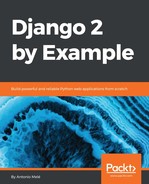The Django object-relational mapping (ORM) is based on QuerySets. A QuerySet is a collection of objects from your database that can have several filters to limit the results. You already know how to retrieve a single object from the database using the get() method. We have accessed this method using Post.objects.get(). Each Django model has at least one manager, and the default manager is called objects. You get a QuerySet object using your model manager. To retrieve all objects from a table, you just use the all() method on the default objects manager, like this:
>>> all_posts = Post.objects.all()
This is how we create a QuerySet that returns all objects in the database. Note that this QuerySet has not been executed yet. Django QuerySets are lazy; they are only evaluated when they are forced to. This behavior makes QuerySets very efficient. If we don't set the QuerySet to a variable, but instead write it directly on the Python shell, the SQL statement of the QuerySet is executed because we force it to output results:
>>> Post.objects.all()
